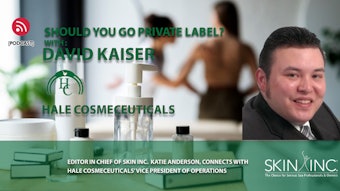Editor’s note: This column is based on the author’s presentation of the same title at Face & Body® Midwest 2012, which took place at McCormick Place West in Chicago in March.
Skin care professionals can run into a variety of financial and legal problems in the course of owning and running a business. Three of the most common issues are vulnerability to lawsuits, overpayment of taxes and the lack of a viable estate plan. Part I of this two-part column will address tactics skin care professionals can take in order to become less vulnerable to lawsuits, and Part II will address the issues of tax overpayment and estate planning.
Avoiding lawsuits
Skin care professionals are exposed to a number of lawsuits, including premise liability, employee liability and others. If you are not properly structured, it only takes one lawsuit to lose everything. The solution is to place assets into properly drafted legal entities.
All of your professional and personal assets can be moved into properly drafted legal entities to ensure that they are 100% unreachable to would-be plaintiffs and attorneys. If an attorney does an asset search on you and your business in conjunction with a potential lawsuit, he will find that there are no assets available to seize. Because most lawsuits are done on contingency, and attorneys want to make sure that they get paid for their efforts, they may not be willing to file a lawsuit against you. Placing your assets into properly drafted legal entities removes the financial incentive for prosecuting attorneys and, thus, helps prevent lawsuits.
Problems with sole proprietorships
Many advisors recommend their skin care facility clients operate as sole proprietorships because of the simplicity—you simply have to report the business on Schedule C of your tax return. There are two major problems with operating as a sole proprietorship.
1. Fewer tax deductions. Although a sole proprietorship allows a person to deduct most business expenses, there are tax deductions and tax reduction strategies that apply to S corporations and C corporations that can’t be used by a sole proprietor.
2. Liability. A sole proprietorship provides zero protection against lawsuits. If your business as a sole proprietorship is sued, all of your business and personal assets can be taken. If you are sued personally as a result of a car accident or injury at your home, all your personal and business assets can be taken. A sole proprietorship puts all of your professional assets—including real estate, equipment and cash—and personal assets—including cash, stocks, home, furniture and cars—at risk of being seized to satisfy a judgment.
Business incorporation
Because of the problems associated with sole proprietorships, many choose, instead, to incorporate their skin care facilities. Although becoming a corporation is a good management and tax-reduction strategy, it is a poor lawsuit-protection plan, in most cases. If your corporation is sued, all of the assets owned by your corporation can be taken to satisfy the judgment. The corporation does provide some protection of personal assets with what is known as the “corporate veil.” The corporate veil is supposed to prevent a creditor from going after personal assets to satisfy a business debt. However, the corporate veil can be pierced, enabling your personal assets to be seized to satisfy a judgment against your business.
FLPs and LLCs
If you own assets in your personal name, as a sole proprietor or in a corporation, the assets can be taken to satisfy a judgment. The good news is that there are legal entities you can use to protect 100% of your professional and personal assets from being taken to satisfy a judgment. Those tools are the carefully constructed and properly worded family limited partnership (FLP) or limited liability company (LLC). Specialized attorneys have retooled the FLP and LLC to include lawsuit-protection principles. The FLP has emerged as a powerful tool to hold assets in order to protect them against lawsuits; and the LLC is an ideal tool to protect real estate and other high-risk assets. Once your assets are properly structured, you will have the financial peace of mind that comes from knowing you are protecting the assets you have worked a lifetime to secure.
Larry Oxenham, an American Society for Asset Protection senior legal advisor, works with the nation’s top asset protection experts and has helped thousands of clients in all 50 states achieve financial peace of mind by properly structuring their assets for tax reduction, lawsuit protection and estate planning.










